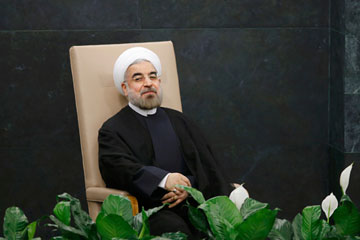
Iranian President Hassan Rouhani waits to address the U.N. General Assembly.
The last time an American President tried to greet his Iranian counterpart informally, the gambit dissolved into a game of hide-and-seek.
The scene unfolded in 2000, when Bill Clinton wanted to introduce himself to Iran's reformist President Mohammed Khatami at the United Nations' annual gathering in New York City. The two leaders were preparing for a painstakingly orchestrated hallway handshake when Khatami balked--he ducked into a bathroom and refused to emerge until Clinton had given up. It turned out that hard-liners back in Iran had issued a last-minute veto to a clutch with the American leader. It would be 13 years before conditions seemed right for another try. At the U.N. on Sept. 24, it appeared possible that President Obama would have his own encounter, to use the diplomatic term of art, with Iran's recently elected President Hassan Rouhani, somewhere in the bustling U.N. complex.
More than at any time since 1979, each side has a strong motive for a rapprochement: Obama wants to prevent Iran from achieving nuclear-weapons capability without risking another Middle East war. Rouhani was elected with a mandate to improve an economy ravaged by sanctions. In the days before the U.N. confab, the Iranians seemed very keen for a presidential handshake, and Rouhani told an interviewer he would consider meeting Obama. White House aides made it clear that the American President was game.
It didn't happen. Officials on both sides discussed a possible meeting in the days leading up to the U.N. event. Reporters hopefully pressed them to ensure that photographers could witness the historic scene. But the planning never reached the 2000 effort's level of detail, and the Iranians aborted. "It was clear that it was too complicated for them," a White House official said. In plain terms, the Obama team was letting it be known that Rouhani had either chickened out--or, much like Khatami before him, had had his leash yanked from Tehran.
At a breakfast the following day with a group of journalists, Rouhani said it was the U.S. that had pushed hard for the meeting and claimed he turned it down because there hadn't been enough time to prepare. Striking a slightly different posture from the one he struck in the lead-up to the General Assembly, he now said Iran "wasn't opposed" to talks but that they should take place only when concrete plans were on the table. "If we don't take the first steps carefully, [we] won't meet our goals," he said.
The weeklong do-si-do's abrupt end was a puzzling turn--and a potentially pivotal one for Obama. Since Rouhani's election in June, the Iranian President has repeatedly signaled a willingness to cut a deal over Iran's nuclear program, which was generally nonnegotiable during the term of his predecessor, the gleefully antagonistic Mahmoud Ahmadinejad. It became clear that Obama was just as eager for a deal--perhaps even more so. But the missed opportunity to meet and Rouhani's vagueness so far on possible concessions suggests that Obama could find himself with no hand to shake after all, right up to the day when he must decide whether to go to war.
